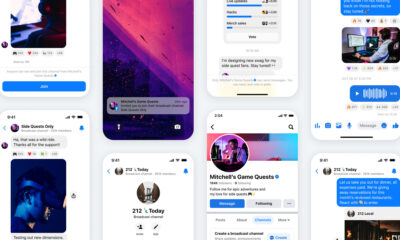News
Facebook Will Create 10,000 Jobs In The EU To Build Its Metaverse
Facebook decided to invest in the EU because the company believes that European talent is world-leading, supported by first-class universities.

Facebook has announced that it wants to create 10,000 jobs in the European Union (EU) to build its metaverse, a virtual reality space in which users can interact with a computer-generated environment and other users.
The concept of the metaverse can be traced to Neal Stephenson’s 1992 cyberpunk novel Snow Crash. In the novel, the metaverse is a virtual shared space that appears to its users as an urban environment. This space is accessed through personal terminals connected to virtual reality goggles.
Sound familiar? That’s because the metaverse is quickly becoming a reality thanks to companies like Oculus, a subsidiary of Facebook, and the combined effort of developers and content creators from around the world.
By creating thousands of new high-skilled jobs within the EU over the next five years, Facebook wants to accelerate the development of the metaverse to usher in a new phase of interconnected virtual experiences, enabled by technologies like virtual and augmented reality.
“At its heart is the idea that by creating a greater sense of ‘virtual presence,’ interacting online can become much closer to the experience of interacting in person,” said Nick Clegg, Facebook’s vice-president of global affairs. “The metaverse has the potential to help unlock access to new creative, social and economic opportunities”.
According to the official announcement, Facebook decided to invest in the EU because the company believes that European talent is world-leading, supported by first-class universities. Facebook also mentioned the role European policymakers are playing in shaping the internet, so it’s likely that the investment has a political dimension to it.
Also Read: How To Lock Your Facebook Profile (From Mobile & Desktop)
Aware of its tarnished reputation, the social media giant stressed that no single company would own and operate the metaverse — just like no single company owns the internet today. Of course, that doesn’t change anything about the fact that Facebook wants to play a huge role in it.
Earlier this year, Mark Zuckerberg told his employees that Facebook is becoming a metaverse company with the goal of building a set of connected social apps and supporting hardware. The recently released Horizon Workrooms remote collaboration app for the Oculus Quest 2 headset can be seen as an early piece of the much larger puzzle the metaverse will become in the future.
News
Samsung Smart Glasses Teased For January, Software Reveal Imminent
According to Korean sources, the new wearable will launch alongside the Galaxy S25, with the accompanying software platform unveiled this December.

Samsung appears poised to introduce its highly anticipated smart glasses in January 2025, alongside the launch of the Galaxy S25. According to sources in Korea, the company will first reveal the accompanying software platform later this month.
As per a report from Yonhap News, Samsung’s unveiling strategy for the smart glasses echoes its approach with the Galaxy Ring earlier this year. The January showcase won’t constitute a full product launch but will likely feature teaser visuals at the Galaxy S25 event. A more detailed rollout could follow in subsequent months.
Just in: Samsung is set to unveil a prototype of its augmented reality (AR) glasses, currently in development, during the Galaxy S25 Unpacked event early next year, likely in the form of videos or images.
Additionally, prior to revealing the prototype, Samsung plans to introduce…
— Jukanlosreve (@Jukanlosreve) December 3, 2024
The Galaxy Ring, for example, debuted in January via a short presentation during Samsung’s Unpacked event. The full product unveiling came later at MWC in February, and the final release followed in July. Samsung seems to be adopting a similar phased approach with its smart glasses, which are expected to hit the market in the third quarter of 2025.
A Collaborative Software Effort
Samsung’s partnership with Google has played a key role in developing the smart glasses’ software. This collaboration was first announced in February 2023, with the device set to run on an Android-based platform. In July, the companies reiterated their plans to deliver an extended reality (XR) platform by the end of the year. The software specifics for the XR device are expected to be unveiled before the end of December.
Reports suggest that the smart glasses will resemble Ray-Ban Meta smart glasses in functionality. They won’t include a display but will weigh approximately 50 grams, emphasizing a lightweight, user-friendly design.
Feature Set And Compatibility
The glasses are rumored to integrate Google’s Gemini technology, alongside features like gesture recognition and potential payment capabilities. Samsung aims to create a seamless user experience by integrating the glasses with its broader Galaxy ecosystem, starting with the Galaxy S25, slated for release on January 22.


























